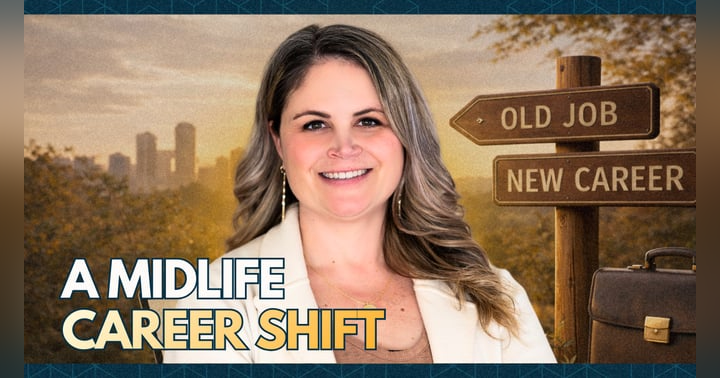What Grief and Caregiving Taught Tony Stewart About Presence and Love

When Life Splits Into “Before” and “After”
There’s a moment Tony Stewart will never forget. His wife picked up the phone, listened quietly, and then looked up and said, “I have tumors in my lungs and spine.” It was a moment that fractured time, splitting their life into the before and after.
Tony didn’t expect to become a full-time caregiver. Most of us don’t. But what he learned in the six years that followed – from diagnosis to hospice to goodbye – reshaped how he saw love, presence, and what it means to show up for someone through grief and caregiving.
This isn’t a story about tragedy. It’s about what we find when we stop running from pain and start letting it live alongside love.
Men, Emotion, and the Pressure to Be “Strong”
Tony grew up in a world where emotions were private at best and shameful at worst, especially for men. When his wife, Lynn, started asking him what he was feeling at the dinner table, he didn’t quite know how to answer.
Over time, though, she helped him access a part of himself that had been buried beneath years of social conditioning. He began sharing honestly. He let himself be vulnerable. And when Lynn’s diagnosis came, that emotional groundwork helped him stay present rather than shut down.
Why “Fighting” Cancer Isn’t Always the Answer
One of the most powerful parts of Tony’s story was his rejection of the word “fight.” He told me that early on, the language of “battles” and “winning” felt comforting. But the longer he and Lynn lived with stage 4 cancer, the more harmful that language became.
“There’s no battle to win,” he said. “There’s just living. There’s presence. There’s making the most of the time you have.”
Instead of turning treatment into a war, Tony and Lynn focused on quality of life. They made thoughtful decisions, including the one to eventually stop treatment and begin home hospice. It wasn’t giving up – it was choosing grace. And that decision gave them space to say the things that mattered.
That part hit me hard. So many of us feel pressure to push through pain. But Tony reminded me that sometimes, presence is braver than persistence.
Writing Through Grief and Finding Purpose
Tony didn’t set out to write a book. At first, he was just updating friends on CaringBridge. Then, after Lynn passed away, the writing kept coming. It helped him process the grief that showed up in waves, and it created unexpected healing for the people reading along.
Over time, those posts became the foundation for Carrying the Tiger, his memoir. It’s a raw, honest look at what it means to love someone through decline, and how to keep living after they’re gone.
Grief never really ends, he told me. “You grieve for as long as someone remains dead.” But you do grow around it. You learn to carry it differently. And sometimes, sharing your story helps someone else find their way through theirs.
A Conversation That Stayed With Me
What made this conversation unforgettable wasn’t just the emotion – it was the clarity. Tony has spent years reflecting on his role as a caregiver, as a husband, and as a man learning to feel more fully. And he shares those reflections with the kind of gentleness that invites you in, not lectures you.
One moment I keep returning to is when he described sitting at the kitchen table the night of the diagnosis, holding Lynn’s hand and just repeating “I love you” back and forth. They didn’t know what was coming next, but they knew they were in it together.
It’s a reminder that presence is the real gift. Not perfection. Not solutions. Just presence.
If you’ve ever navigated grief, supported someone through illness, or struggled to let yourself feel the full weight of love and loss, I think this story will mean something to you, too.
🎧 You can listen to Tony’s episode at www.thelifeshiftpodcast.com/188














